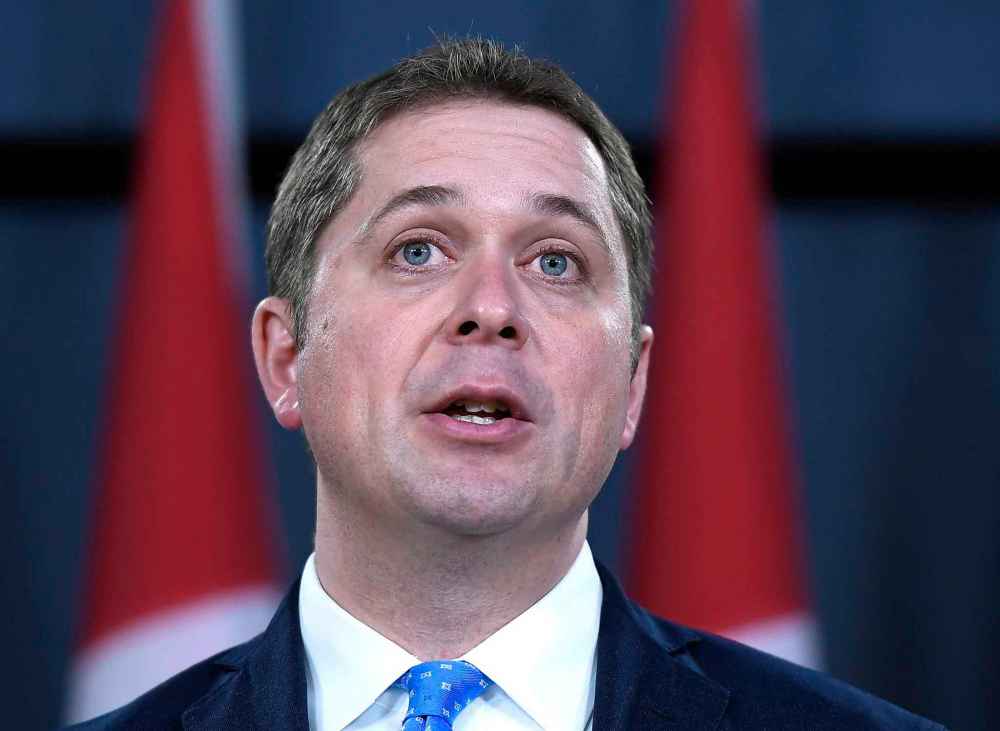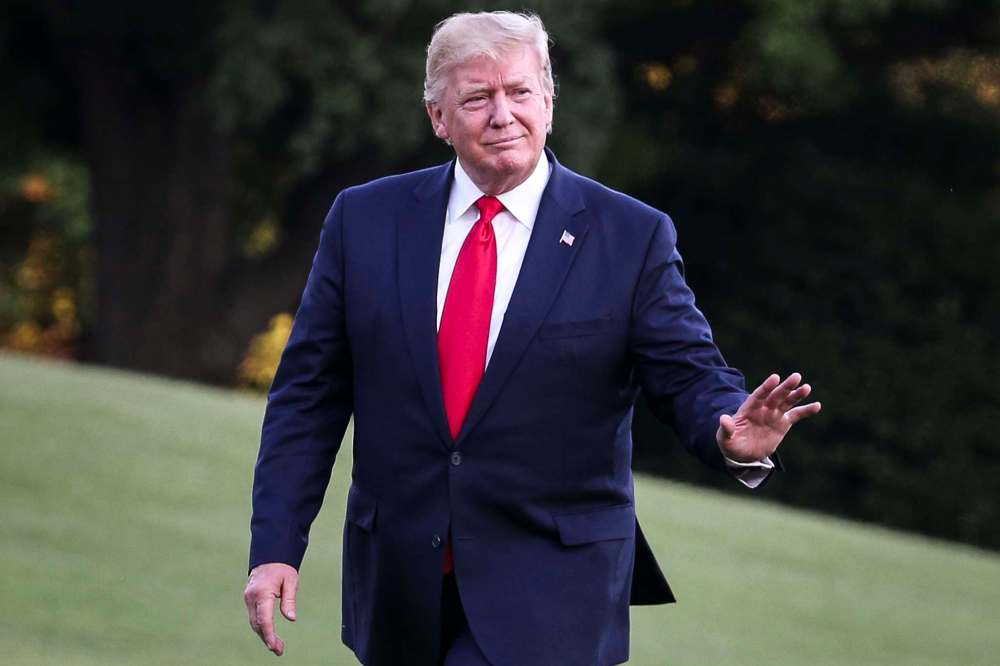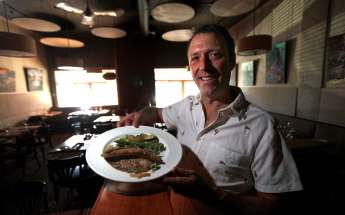Smaller-tent politics Scheer madness for Tories? Ask President Trump
Read this article for free:
or
Already have an account? Log in here »
To continue reading, please subscribe:
Monthly Digital Subscription
$0 for the first 4 weeks*
- Enjoy unlimited reading on winnipegfreepress.com
- Read the E-Edition, our digital replica newspaper
- Access News Break, our award-winning app
- Play interactive puzzles
*No charge for 4 weeks then price increases to the regular rate of $19.00 plus GST every four weeks. Offer available to new and qualified returning subscribers only. Cancel any time.
Monthly Digital Subscription
$4.75/week*
- Enjoy unlimited reading on winnipegfreepress.com
- Read the E-Edition, our digital replica newspaper
- Access News Break, our award-winning app
- Play interactive puzzles
*Billed as $19 plus GST every four weeks. Cancel any time.
To continue reading, please subscribe:
Add Free Press access to your Brandon Sun subscription for only an additional
$1 for the first 4 weeks*
*Your next subscription payment will increase by $1.00 and you will be charged $16.99 plus GST for four weeks. After four weeks, your payment will increase to $23.99 plus GST every four weeks.
Read unlimited articles for free today:
or
Already have an account? Log in here »
Hey there, time traveller!
This article was published 03/07/2019 (2354 days ago), so information in it may no longer be current.
When Conservative Leader Andrew Scheer confirmed that, once again, he would not attend this year’s Pride Day festivities in Toronto, you could almost hear the poles collapsing under the big-tent theory of electoral politics.
The “big-tent” describes the process by which politicians cultivate support from as many different constituencies as possible to ensure the greatest chance of winning an election. They do this by attempting to support the issues that appeal to the broadest swaths of the electorate.
Given the nation’s opinion on LGBTTQ+ issues, you would think that Scheer’s decision to bypass Pride is a foolish one.

A recent online poll by Public Square Research and Maru/Blue for CBC found that 85 per cent of respondents described themselves as “LGBTQ-friendly.” That makes Pride Day and the events that take place all over the country a must for most mainstream politicians.
In Winnipeg, Mayor Brian Bowman and Premier Brian Pallister have both attended Pride in every year in which they held their current offices. In what is a clear tribute to classic big-tent political strategy, both politicians utilize Pride to appeal to the broadest possible audience of voters.
Why would Scheer spit in the face of this widely accepted political strategy? Some have theorized that his strong religious sensibilities play a role. Others believe he is still paying off a debt to social conservatives in his party who helped push him over the top in the 2017 leadership race.
But perhaps there is another explanation: he no longer believes in big-tent politics. It’s quite possible Scheer is willing to bet that he can win an election without currying support from LGBTTQ+ activists and other Canadians who are sympathetic to their cause.
It seems counterintuitive until you consider what’s happening in other countries. The United States, for example.
President Donald Trump has what are arguably the lowest levels of support ever for a sitting president in the third year of a first term. Polling firm Gallup recently complied job-approval ratings for every sitting president going back to Dwight Eisenhower at the 10th-quarter mark of their first terms. The average approval rating was 54 per cent; Trump is at 41 per cent.
Normally, that would be a major source of concern for Republicans. But the whole notion of “normal” in politics is undergoing a bit of a transformation.
Trump’s re-election campaign reported this week it had raised $105 million during the second quarter of 2019. That’s more than twice what Barack Obama raised in the same quarter of his first term.
Even more impressive is the fact that Trump attracted donations from 725,000 individuals. A Republican party official told the New York Times it was the first time ever that Republicans had more individual donors of less than $200 than the Democratic party.
It all means that even though Trump has arguably less support among Americans now than he did in 2016, core supporters are more dedicated than ever to his re-election. That explains why, rather than moderating his policies to appeal to a bigger tent of support, Trump has continued to venture ever further out to the extreme edges of issues such as immigration, justice, trade and the environment. The more extreme he becomes, the more galvanized his base.
In one of the greatest gaffes in U.S. political history, Democratic presidential nominee Hillary Clinton once characterized Trump’s supporters as a “basket of deplorables.” It is believed that phrase energized Trump’s support,. Now, it may be that Trump needs only the deplorables to get elected, if all of them show up to vote.

When we try to measure the popularity of politicians between elections, we are capturing the feelings of both voters and non-voters. However, as Trump demonstrated in 2016 — when he lost the popular vote but won in the Electoral College — you do not need a majority of all citizens to get elected. That only requires a majority of the people who actually vote, distributed strategically in the right areas.
And when voter turnout is low, then smaller but more committed constituencies — Trump’s deplorables, for one — have greater influence on the final result.
That kind of electoral phenomenon was thought to be impossible to replicate in Canada. However, every time Scheer does something that flies in the face of big-tent politics, it makes you wonder if he’s only concerned about whether his core supporters make their way to the polls in October.
Why would Scheer address the United We Roll protest in Ottawa last February, a gathering that included some truly intolerant individuals and organizations, including self-professed white nationalist Faith Goldy? He was criticized for appearing at the event, but was unrepentant about it afterward.
Conservatives argued that supporting United We Roll was not a sign Scheer is intolerant, just as skipping Pride in Toronto is not proof he is anti-LGBTTQ+. They point to the fact that in 2017, Scheer supported Prime Minister Justin Trudeau’s apology to sexual minorities. And that Conservatives introduced a motion in the House of Commons last year to condemn Russia for its persecution of the LGBTTQ+ community in Chechnya.
Both are worthy gestures, but they do not free Scheer from the obligations of political leadership, which requires leaders to not only support a cause, but be seen to support that cause.
Then again, political leaders may be learning that they need only support causes that speak to core supporters with the comfort of knowing that if all of them show up, it may be enough to win.
dan.lett@freepress.mb.ca

Born and raised in and around Toronto, Dan Lett came to Winnipeg in 1986, less than a year out of journalism school with a lifelong dream to be a newspaper reporter.
Our newsroom depends on a growing audience of readers to power our journalism. If you are not a paid reader, please consider becoming a subscriber.
Our newsroom depends on its audience of readers to power our journalism. Thank you for your support.










